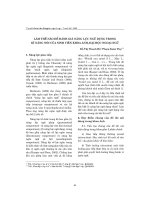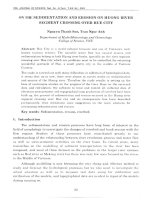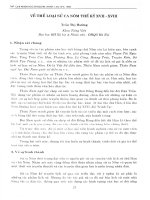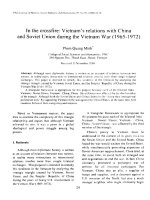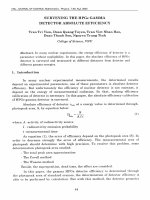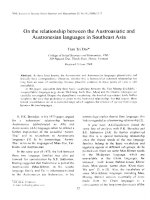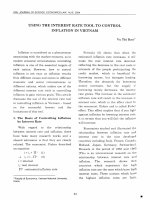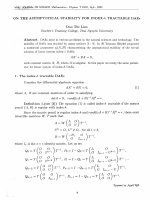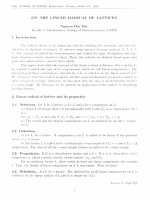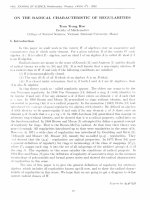DSpace at VNU: Surveying the HPGe Gamma detector absolute efficiency
Bạn đang xem bản rút gọn của tài liệu. Xem và tải ngay bản đầy đủ của tài liệu tại đây (2.42 MB, 6 trang )
V N U . J O U R N A L O F S C IE N C E , M a th e m a tic s - P h y s ic s ,
T.xx,
N 02, 2 0 0 4
S U R V E Y IN G T H E H P G e G A M M A
D E T E C T O R A B SO L U T E E F F IC IE N C Y
T r a n Tri V ie n , D o a n Q u a n g T u y e n , T r a n V ie t N h a n H ao ,
D o a n T h a n h S o n , N g u y e n T r u n g T in h
College o f Science, V N U
A b stra c t. In many nuclear experiments, the energy efficiency of detector is a
parameter without negligibility. In this paper, the absolute efficiency of HPGe
detector is surveyed and mearsured at different distances from detector and
different gamma energies.
1. I n t r o d u c t i o n
In
m any n u c le a r e x p e rim e n ta l m e a s u re m e n ts ,
t h e d e te rm in e d resu lts
d epend on e x p e rim e n ta l p a ra m e te r s , one of th e s e p a r a m e t e r s
is absolute detector
efficiency. B u t u n f o r tu n a te ly th e efficiency of n u c le a r d e te cto r is n o t constant, it
dep en d on th e energy of m e a s u re m e n ta l ra d ia tio n . So t h a t , m aking efficiency
c a lib ra tio n of d etector is n e ce ssa ry . In th is p a p er, th e a b so lu te efficiency calibration
of H P G e g a m m a d etector is surveyed.
A b s o l u t e e f f i c i e n c y o f d e t e c t o r TỊabs a t a e n e r g y v a l u e i s d e t e r m i n e d t h r o u g h ,
ph oto peak a re a, s , by e q u a tio n below:
s
nlabs = —
—
A.I.t
ị
V
(1)
w here: A -activity of ra d io a c tiv ity source
I - ra d io a c tiv ity em issio n probability
t. - m e a s u re m e n ta l tim e
As e q u a tio n (1), t h e e rro r of efficiency d ep end on t h e p h o to p ea k area (S). In
order to d ecrease stro n g ly th e e rro r of efficiency. T h e m e a s u re m e n ta l are a of
ph otopeak should d e te rm in e w ith h ig h precision. To resolve th is problem, some
d e te rm in a tio n p h o to p ea k a re a stu died :
- T he to ta l p e ak a re a a p p ro x im a tio n
- T he Covell m e th o d
- T he W asso n m eth o d
Beside, th e su p e rp o sitio n , d e ad tim e, th e effect a r e consided.
In th is p a p e r, th e g a m m a H P G e detector efficiency is d e te rm in e d through
th e pho to p eak a re a of s t a n d a r d sources, th e d e te rm in a tio n of detector efficiency is
able to be p erfo rm ed by c alculation. B u t w ith th is m eth o d , th e d etector geometry
44
Surveying the HPGe g a m m a d e te c to r abso lute efficiency
45
has to be known. So, in e x p e rim e n t, th e efficiency c a lib ra tio n m eth o d is combined
w ith sem i-em pirial re la tio n be come m ost reliable.
In order to reject th e influence of th e d isto rtio n of p h o to p e a k s h a p e due to th e
high activity a n d by th e co u n tin g loss due to th e pile-up effects, th e sam p le should
be p u t at place w ith different d istan c es to detector.
For fitting th e e x p e rim e n ta l d etector efficiency d a ta w ith th e o ric a l fuction. In
th is paper, two th eo rica l fu nctions describing th e d ep en d en ce of efficiency on energy
are used, such as:
r| = y H.lnte) 1
1 = 1 (1 ,^ '
2. E x p e r im e n t a l a b s o l u t e e f f i c i e n c y c a l i b r a t i o n
For g e ttin g e x p e rim e n ta l efficiency value. T he sources w ith different g am m a
ray energies a re u s e d in our e x p erim en t: E u 152, C s137 a n d A m 241. T he sources w ith
shap of disk w ith 1 Cm r a d iu s a re su pplied by IAEA w ith p a r a m e t e r s as following:
S o u r c e : E u 152
Half-life: 12.7 Y ear
D a te of produce: A u g u s t l 8t 2002
A ctivity initial: 3672.62 Bq
S o u r c e : A m 241
Half-life: 433 Y ear
D a te of produce: J u ly 15th 2002
A ctivity in itial: 3759.2 Bq
S o u r c e : C s 137
lf-life: 30.1 Y ear
D a te of produce: D ecem ber l 8t 1994
A ctivity in itial: 36445 Bq
For efficiency c a lib ra tio n of detector, in our e x p e rim e n t we h a v e to know th e
activity of source a t th e e x p e rim e n ta l tim e. T h is w ork is n o t difficult by using
equation:
A=A0e Xt
The p a r a m e t e r s of e x p e rim e n t w ith H P G e g a m m a v isio n sp e ctro m etry are
given in table 1 a n d plot of e x p e rim e n ta l efficiency c a lib ra tio n in fig .l.
46
T r a n Tri Vien, D o a n Q u a n g Tuyen, T r a n Viet N h a n Hao...
T a b le l. The efficiency of detector depend on energies a t 2 cm from detector
Order
Number
Count
Energy
(KeV)
It
(%)
1
121.7793
30.6788
14020
9
344.31
97 9
3
411.13
4
Count pel'
second
Activity
of source
Detection
efficiency
46.7350
1057.0718
0.0442±2%
6977
23.2591
937.2056
0.0248±2.3%
2.2848
544
1.8189
78.7253
0.0230±9%
778.91
12.7187
1517
5.05667
438.2368
0.0115±4%
5
964.05
14.3344
1633
5.44500
493.9075
0.0110*4%
6
1085.81
10.0966
1072
3.57367
347.8895
0.0103±3%
7
1112.08
13.4042
1244
4.14667
461.8565
0.0090±4%
8
1408.08
20.7264
1562
5.20667
714.1509
0.0073±4%
9
(Am) 59.739
35.75
5983
9.97200
1341.13114
0.0074±1.7%
10
(Cs)661.38
85.05
37674
418.5944
25278.6461
0.0166±6%
After fitting the exp eim ental d a ta with the theorical function:
’1 =
r| = Ỵ a M E ) 1
and
the absolute efficiency function of HPGe gam m avision sp e c tro m e try is as following:
11,
(E) = 11.5436 E '1- 1110.34 E'2 + 60344.9 E 3 -2008730 E 1
rj2(B) =-3.09414(lnE) 1+73.7661(lnE)'2-687.098(lnE )'3+ 2 9 6 7 .1 l(ln E ) 4-4814.21(lnE)'5
(3)
Absolute
efficiency
0.04
0.0 3
0.02
0.01
200
400
600
800
1000
1200
1400 Energy
Fig. 1 The dependence of efficiency of detector on energies a t 2 cm from detector
47
Surveying the HPGc g a m m a detector absolute efficiency
T a b le 2 . The efficiency of detector depend on energies a t 5 cm from detector
Order
Number
Energy
(KeV)
Iy
(%)
Count
Count per
second
Activity
of source
Detection
efficiency
1
121.7793
30.6788
37400
10.3889
1057.0718
0.0098±1.72%
9
244.6927
7.7193
295.96
0.4324
1.5944
0.0747
265.9770
3
0.0060±2.71%
0.0050±1.16%
4
5
344.32
444.03
97 9
5740
269
15500
2.8832
1320
6
7
688.62
778.91
0.8514
12.7187
220
8
9
4.0963
10
867.39
964.05
1005.06
14.3344
0.6364
852
2990
134
11
1085.81
10.0966
1960
0.0372
0.5444
12
13
1089.73
1112.08
1.8115
14
15
1212.94
230
1299.2
13.4042
1.496
1.74624
356
2560
16
1408.08
20.7264
14.8988
937.2059
4.3056
0.3667
0.0046±2.01%
99.3438
0.0037±4.82%
0.0611
0.9194
29.3359
438.2368
0.0021±13.6%
0.0021±3.16%
0.2367
141.1425
493.9075
21.9306
0.0017±6.36%
0.0017±3.17%
347.8895
0.0016±3.6%
0.0989
0.0711
62.4172
461.8565
0.0016±1.16%
0.0015±3.02%
246
0.0639
0.0683
51.5463
60.1686
0.0012±11.24%
0.0011±1.16%
3140
0.8722
714.1509
0.0012±2.81%
3310
0.8306
0.0017±16.81%
A b so lu te
efficiency
200
400
600
800
1000
1200
1400
Fig.2. The dependence of detector efficiency on th e energies a t 5cm from detector
After fiting th e e x p eim e n tal d a ta with th e theorical function:
and
TỊ =
^ a-ln(i?)_l
48
T r a n Tri Vien, D o a n Q u a n g Tuyen, T r a n Viet N h a n Hao..
th e absolu te efficiency fun ction of H PG e g a m m av isio n sp e c tro m e try is as following:
6l(E) = 1.65095 E 1 - 30.281 E '2 - 3103.08 E 3
e2(E) = 0 .3 6 0 4 5 8 (ln E )1-7.62022 (InE)-2 +43.9916(lnE )'3 -84.6 5 7 1 (ln E )4 (4)
F ig .3. T he d ep en d en ce of a b so lu te efficiency of d etector on e n erg ies of HPGe gam m a
G a m m a v isio n spectrom etry.
Absolute
efficienc
Fig.4. The depen dence of a b so lu te efficiency of detector on e n erg ies of HPGe gam m a
G e n n ie 2000 sp e ctro m etry
Su rveying the HPGc g a m m a dete ctor absolute efficiency
49
In order to d e te rm in e th e dependence of ab so lu te d etector efficiency on
gam m a energies at d ifferen t d istan c es from d etector to source. G a m m a sources are
placed at different d ista n c e s from detector surface. In o u r e x p erim e n t, g am m a
sources are placed a t position from 2 cm to 16 cm to su rfa ce of detector.
The absolute efficiency of H P G e g a m m a G a m m a v isio n sp e ctro m etry are
show n in fig.3.
The absolute efficiency of H PG e g am m a G en nie 2000 s p e c tro m e try a re show n
in fig.4.
3.
R e s u lt s a n d d i s c u s s i o n
F ittin g th e e x p e rim e n t d a ta for d e te rm in in g a b so lu te efficiency of detector
w ith theorical functions is c a rr ie d out.
In order to select th e m ost su itab le theorical fu n ctio n for fittin g with
ex p erim en tal data. T he fittin g p a ra m e te r s of e x p e rim e n ta l d a ta wich theorical
functions:
T! = £
and
a,:l n ( E ) '
n=x > £ ‘
(5)
(6)
a re compared.
In general, th e fittin g d ia g ra m s of th ese two fu n ctio n s a re closing to
ex p erim en tal points. However, th e function (2) is m ore s u ita b le to h igh energentic
rad iatio n s because B
coefficients h a v e sm a lle r failu res, th e re fo re , e rro r a re sm all.
A c k n o w l e d g e m e n t s : T he V ie tn a m N a tio n a l U n iv ersity , H anoi su p p o rts this
work throug h th e subject QG-04-02.
R eferen ces
1.
Boston M., E r d u r a n M .N .,Sirin M. a n d S u b a st M., Isom eric cross-section ratio
for the (n,2n) re a c tio n on Sc from 13.6 to 14.9 MeV , Phys. Rev, New York, V.
56, No 2(1997), pp 918-921.
2.
w . M a a h a r t a n d H. Vonach, T he g am m a-ray a b so rp tio n coefficients for Nal(Tl),
Nucl.Instr. Meth. E lsevier, V.134, No 4(1976), pp 347-351 .
3.
Kolev D., S tu dies of som e Isom eric Yield R atios P ro d u ced w ith B re m s s tra h lu n g ,
Appl. R ad ia ti. h o t , G r e a t B rita in , V.49, No. 8(1998), p p .989-995.
4.
Seuyng-Gy Ro,..., A bsolute dection efficienies of cy lin d ric a l N al(T l) c ry s ta l for
point source g a m m a-ra y s, J.Kor.Asso.Radiat. Prot, Korea, V. 8, No 3(2002), pp
235-241.
